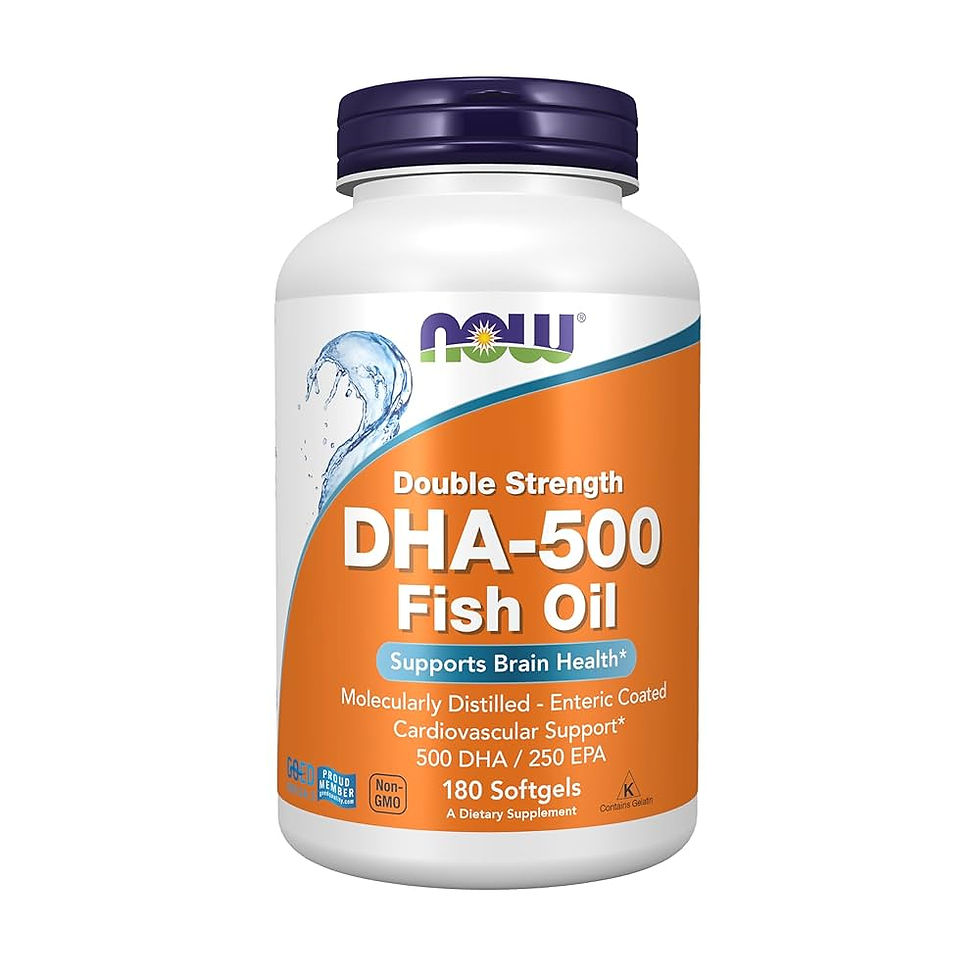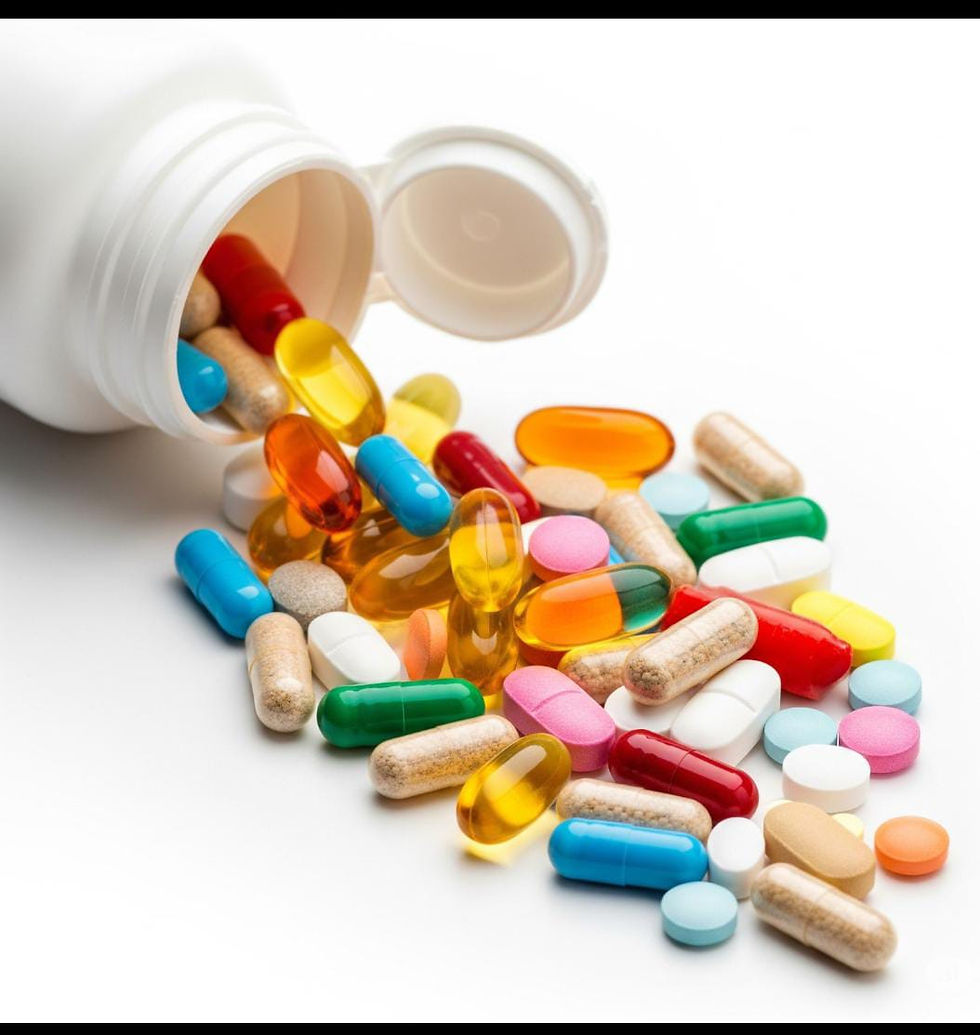The Role of DHA in ADHD and Autism: Promising Support or Overstated Hope?
- Pharm. Onyehalu Jennifer

- Jun 27, 2025
- 4 min read
In the world of child development and neurodiversity, parents and caregivers are always searching for better, safer, and more natural ways to support their children. One nutrient that frequently enters these discussions is DHA, a type of omega-3 fatty acid known for supporting brain health.
For conditions such as Attention Deficit Hyperactivity Disorder (ADHD) and Autism Spectrum Disorder (ASD), DHA has been suggested as a possible aid. But does it truly help? The honest answer is that the science is still evolving, and many findings remain inconclusive.
What Is DHA and Why Is It Important?
DHA, short for docosahexaenoic acid, is a long-chain omega-3 fatty acid that plays a key role in the structure and function of the brain. It is especially concentrated in the gray matter, which is responsible for memory, emotion, and cognitive processing.
Because of its role in brain development and communication between nerve cells, DHA is often promoted as a "brain-boosting" nutrient. This has sparked interest in whether increasing DHA intake could help manage symptoms in individuals with ADHD or autism.

DHA and ADHD: What Do We Know?
Some studies have found that children with ADHD tend to have lower blood levels of DHA compared to children without the condition. This has led to the idea that supplementing with DHA might improve attention, reduce impulsivity, or support emotional control.
Research findings are mixed. A few clinical trials have shown mild improvements in attention and behavior in children who took DHA supplements for several months. However, other studies found no significant difference between DHA and a placebo.
The benefits, when present, tend to be modest and are not seen in all children. For some, particularly those with very low omega-3 levels to begin with, supplementation might be more helpful. But overall, DHA should be viewed as a supportive option rather than a reliable solution.
DHA and Autism: What Does the Research Say?
The use of DHA in managing symptoms of autism is also being explored. Some early studies have tested whether omega-3 fatty acids could help with language skills, repetitive behavior, sleep, or anxiety in children with ASD.
The outcomes have been inconsistent. Some parents reported noticeable changes in social interaction or reduced irritability, while others saw no improvement. Clinical studies often show minimal or no statistically significant changes.
It is clear that more high-quality, large-scale research is needed. DHA may offer benefits to certain individuals, but at this point, it cannot be considered a proven treatment for autism-related symptoms.
Why Are the Results Inconclusive?
Several factors contribute to the mixed findings:
The brains of children with ADHD or autism are diverse. Each case is different, so a one-size-fits-all approach rarely works.
Different studies use different types of omega-3 formulations. Some focus only on DHA, while others combine it with EPA, another important omega-3.
The doses and duration of supplementation vary across studies.
Some trials do not have control for factors like diet, therapy, or medications, which may influence outcomes.
Because of these variables, it is difficult to draw firm conclusions about the effectiveness of DHA.

Should You Consider Trying DHA?
If you are thinking about trying DHA to support ADHD or autism symptoms, it is important to set realistic expectations.
Here are a few things to keep in mind:
What to do:
Speak with a healthcare provider before starting any supplement, especially if the child is on medication or following a treatment plan.
Choose high-quality, third-party tested supplements.
Monitor symptoms and keep track of any changes in focus, mood, or sleep.
Use DHA as part of a broader, individualized care strategy.
What not to do:
Do not use DHA as a substitute for behavioral therapy, education plans, or prescribed medications.
Do not expect immediate or dramatic results.
Do not rely on personal anecdotes as scientific proof. Every child is different.
Natural Sources of DHA
If you prefer food-based options, here are the best sources of DHA:
Fatty fish such as salmon, sardines, mackerel, and tuna
Fish oil supplements
Algal oil (a plant-based alternative suitable for vegetarians and vegans)
DHA-enriched eggs or fortified dairy products
Recommended Intake
There is no official daily requirement for DHA when managing ADHD or autism. However, research studies typically use doses in the following range:
250 to 600 milligrams per day for children
Up to 1000 milligrams per day for teens and adults
Always follow professional guidance regarding dosage.

Final Thoughts
DHA is a fascinating nutrient. It is essential for brain development and function, and it is generally safe to use under supervision. However, the current scientific evidence does not support the idea that it is a guaranteed solution for ADHD or autism.
For some individuals, DHA may offer support as part of a well-rounded care plan. For others, it may not make a noticeable difference. The most important thing is to approach it with a clear mind and realistic goals.
Support for neurodevelopmental conditions should always be individualized, compassionate, and evidence-informed. DHA can be one of many tools, but it is not the only one.











Comments